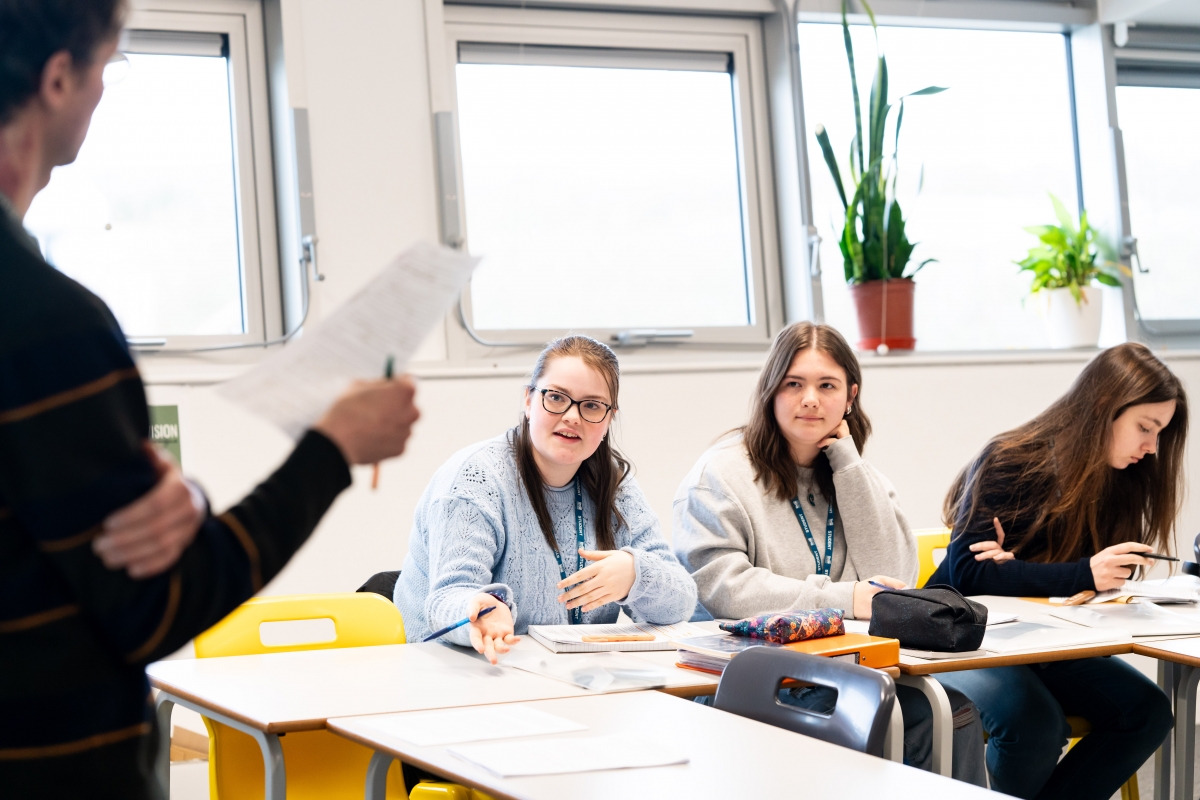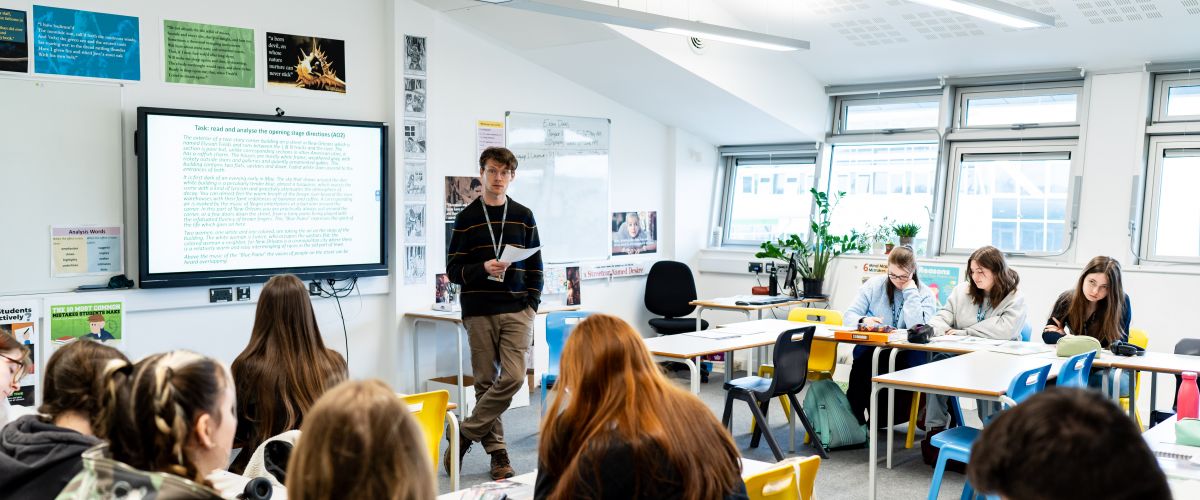A Level English Language
Imagine you could take your innermost thoughts and insert them into someone else’s mind. Well, you already have the ability to do this: it is called language. How do we learn how to speak and write? Where do words come from? Is the language currently being corrupted or is linguistic change gr8? By studying English Language you will explore these questions and more...
Key information
English & Languages / Full Time / A Levels and Equivalent

Why choose this course?
You will learn to analyse texts effectively while applying a range of theories and using detailed linguistic terminology. As well as texts studied in class, you will also be encouraged to select your own texts! You will explore how spoken, written and multimodal texts are in influenced by context and both reflect and construct personal or corporate identities. The language analysed will be incredibly diverse including everything from a short informal text message between friends to a formal speech by the Prime Minister in the House of Commons.
You will also explore the exciting and controversial area of child language acquisition. How can children learn to form words and sentences within just a few years? Do children have an innate ability to learn language or do they simply imitate others? We will explore the views of theorists in response to such questions and we will analyse a range of texts both by and featuring children.
How has the English language changed since 1550? From the in influence of Caxton’s printing press, the King James Bible and Shakespeare’s plays all the way through to the in influence of the Internet, text speak (or ‘txtspk’!) and Americanisation, you will investigate how English varies globally, regionally and socially and consider attitudes towards language change.
You have plenty of opportunity to pursue your own interests in this subject. You will produce your own creative writing in a genre of your choice and you will also conduct an independent investigation which can focus on topics such as gender, power and journalism.
What will I learn?
Year 1
Context and Identity
In Year 1 you explore how the contexts in which texts are produced affect the language choices that everyone makes. You will explore how writers and speakers present themselves to their different audiences and use language to construct identities through their language choices. You will consider the way that language use is influenced by the function (purpose) and audience of texts, geographical factors and social factors such as gender, age, ethnicity and other social identities. You will develop your analytical skills through applying linguistic terminology and theoretical approaches to a range of spoken, written and multimodal texts.
Child Language
This is a hugely exciting and popular area of English Language. You will explore the development of child speech and writing between the ages of 0 and 8. You will study a range of theories associated with child language acquisition and analyse a range of texts including transcripts featuring different children and written language both by and for children.
Year 2
Language Variation (exam – 2 hr 15 min: 35% of A Level)
This component is similar to Component 1 at AS. You will explore the different ways language varies depending on mode (text type), field (topic), function (purpose) and audience and the ways language choices can create personal identities. You will also explore language variation over time – in other words, the way in which the language has evolved from 1550 to the present day.
Child Language (exam – 1 hr 15min: 20% of A Level)
This component is very similar to the content of Year 1 where we will revisit and explore how children learn to speak and write between the ages of 0 and 8 by applying the appropriate theories of children’s language development.
Investigating Language (exam – 1 hr 45 min: 25% of A Level)
This component encourages you to work independently and develop your research and investigation skills; this exam represents a real opportunity for you to explore an area of language that particularly interests you. The main five topics you can choose from include:
Global English – varieties of English around the world
Language and Gender Identity – how gender and sexual identities are constructed through language
Language and Journalism – print and online journalism including notions of bias, subjectivity and objectivity
Language and Power – power relationships within society; political discourse, persuasion, prestige and politeness
Regional Language Variation – regional varieties of English within the UK
Coursework: Crafting Language (20% of A Level)
For your coursework you will develop your research skills as you explore your chosen genre of writing and demonstrate your skill as a writer. You will be asked to produce two texts within the same genre differentiated by either the function (purpose) or audience. In a written commentary, you will then discuss, analyse and compare and contrast your own pieces of writing with style models which have influenced your writing. Examples of genres include newspaper and magazine articles, speeches, short stories and travel writing, amongst many others!
Assessment Arrangements
Your achievement in this subject is dependent upon excellent attendance and effort. You will learn in a friendly and safe atmosphere, using a variety of assessment methods:
You will be assessed on written essay work which will be completed either as homework or under timed conditions in class and you will be given constructive feedback on your progress.
Class discussions are a vital part of our assessment process and you will be encouraged to contribute.
You will review your own performance in 1:1 sessions with your lecturer.
You will undertake mock examinations on each unit in advance of your final external examinations at the end of year 2. The examinations are traditional and essay based in order to test your understanding of the texts.
Information & Support
We encourage all students to read a wide range of texts and to conduct their own research into language, especially those who wish to study language or linguistics at degree level. You will keep a record of your own independent research data such as the results of observations, questionnaires and surveys as well as analysis of diverse texts. The sort of texts collected and analysed include everything from product labels, music lyrics and interesting short newspaper headlines to complex newspaper articles, literary works and even your own creative writing!
What will I need?
Five GCSEs at grade 4 or above including a grade 6 or above in English Language. Successful A Level students would normally have achieved a grade 6 in a number of relevant GCSE subjects. It clearly helps to enjoy reading and have an interest in grammar and a love of the written and spoken word. You also need to be highly motivated and capable of carrying out independent research and wider reading.
Where will it take me?
A qualification in English Language is highly valued by many universities and employers alike. English Language is also an excellent subject to complement many courses, such as English Literature, Psychology, Sociology, Media Studies and Education. Some university courses also require an A Level in English Literature.
Additional Information
Awarding Body:
Edexcel
To obtain more information about this course, please call: 01208 224000 or visit enquiry@callywith.ac.uk


